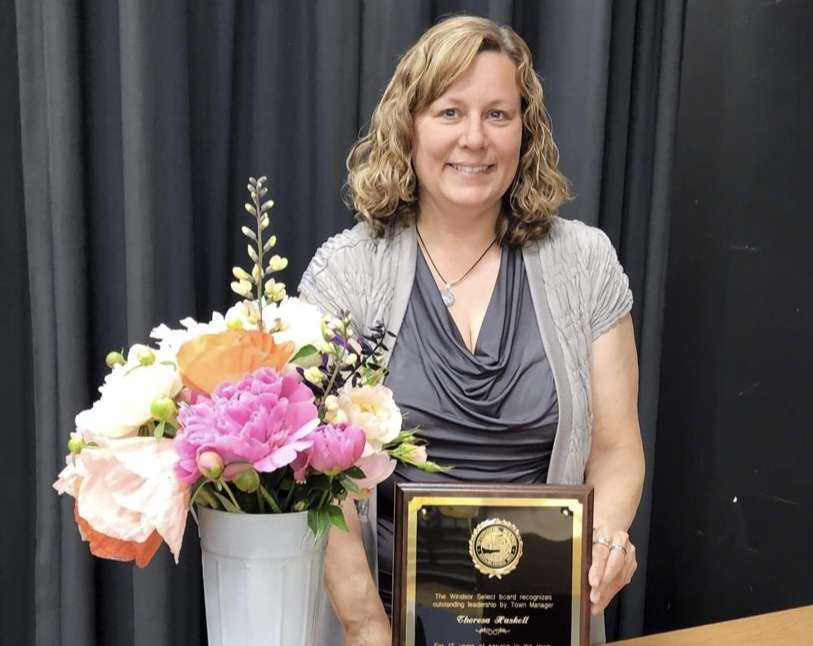Vassalboro select board tackles three big projects
 by Mary Grow
by Mary Grow
Vassalboro select board members had three big projects on the agenda for discussion at their July 14 and future meetings, and resident Tom Richards proposed an even bigger fourth one.
Board chairman Barbara Redmond has been working on a draft solar ordinance, as requested by a majority of the voters who answered a non-binding question at the polls June 14. She asked for more suggestions before the draft is ready for review by the town attorney.
Redmond hopes to have an ordinance ready to present to voters on Nov. 8.
(China Planning Board members hope to present a solar ordinance to China voters on Nov. 8. According to the Town of Windsor website, Windsor Planning Board members are working on an ordinance on solar farms.)
Conservation Commission members Holly Weidner and Peggy Horner presented two proposals, to develop the new park on Outlet Stream and to try to make Vassalboro eligible for a new state grant program.
Weidner said the park proposal, on town-acquired land between East and North Vassalboro, envisions a parking lot big enough for six cars off Route 32, a crushed stone path to the stream, small fishing platforms of stone or wood on the bank and picnic tables. Vassalboro voters appropriated $20,000 for work at the park at their June 6 town meeting.
So far, Weidner said, the Vassalboro public works crew has cleared brush and removed some trees. The Conservation Commission has obtained a state highway entrance permit, and has filed an application with the state Department of Environmental Protection for work near the water.
A future issue is the extent of town maintenance, like mowing, renting a portable toilet and perhaps providing water from a well on the property. Depending on park uses, a pavilion or other shelter might be added. Weidner said the unofficial name of the property is Eagle Park, because so many eagles, ospreys and great blue herons congregate, especially when alewives are running.
Select board members encouraged Conservation Commission members to proceed.
Horner explained briefly the potential advantages of Vassalboro’s participating in the program from the Maine Governor’s Office of Policy Innovation and the Future, called Community Resilience Partnership (CRP).
The goal is to prepare Maine municipalities for effects of climate change. CRP provides “direction and grants” (from $5,000 to $50,000) to support projects that “reduce greenhouse gas emissions and make communities more resilient to the impacts of climate change.”
The application process requires a self-evaluation of potential hazards and ways to try to mitigate them and choosing from a long list of possible projects, followed by a “community workshop” to review the evaluation and prioritize the projects. Horner said the Conservation Commission cannot do the evaluation; she suggested a small group of well-informed residents could put it together in a few hours.
Town Manager Mary Sabins’ reaction was, “Why not?” Select board members agreed trying to make a fall 2022 grant application deadline was not realistic; the spring 2023 round would be more feasible.
More information is on the CRP website, Maine.gov/future/climate/community-resilience-partnership.
Richards proposed that town officials look into acquiring and replacing the bridge over Seven Mile Stream on Cushnoc Road, the southernmost section of old Route 201 (Riverside Drive). State officials have limited loads on the state-owned bridge to the point where Vassalboro’s larger public works trucks and fire trucks cannot use it and businesses using heavy equipment are inconvenienced.
There is no firm information on state intentions; the expectation among meeting participants was that the state will continue to reduce the weight limit and eventually close the bridge. Richards sees closure as a major safety issue for Cushnoc Road residents.
Sabins said an engineer had given an informal cost estimate, based on another similar project, of one million dollars.
Board members intend to carry on with just-retired chairman Robert Browne’s idea of a visioning/planning session, a special meeting to consider long-range, large-scale issues, and will likely have the CRP and perhaps the Cushnoc Road bridge on the agenda. The special meeting is tentatively to be in October.
Also postponed, perhaps to that meeting, was discussion of use of the rest of the town’s American Rescue Plan Act (ARPA) money. Sabins’ figures show a balance of $463,206.05.
Board member Chris French asked whether the China Lake outlet dam needed work that ARPA funds might cover. Sabins replied that Maine’s dam inspector, Tony Fletcher, had looked at the dam recently and found no big issues.
Fletcher did recommend clearing grass from the top of part of the dam and putting in crushed stone, she said. The grassy area is in mid-stream; Sabins is confident the public works crew will find a way to move crushed stone out to it.
In other business July 14, in a series of unanimous decisions, select board members:
- Reappointed John Phillips as a planning board member (his name was accidentally omitted from the June 23 list) and appointed Kenneth Bowring to the Trails Committee and Daniel Bradstreet as the alternate planning board member.
- Authorized Road Foreman Gene Field to contract for this summer’s paving, with the understanding that if the budget cannot cover all proposed work, the end of Cook Hill Road will remain gravel.
- Waived the town procurement policy and authorized Field to negotiate with O’Connor Auto Park, in Augusta, for a new town public works truck, facing the possibility of a budget-busting price increase.
- Extended contracts with current trash haulers for a year, at higher prices, as expected and budgeted for.
- Reviewed, with appreciation, Transfer Station Manager George Hamar’s suggestions for a Quonset hut type covering for the new compactors at the transfer station, but postponed a decision.
Vassalboro select board members meet only once a month in July and August, instead of every other week. Their next regular meeting is scheduled for 6:30 p.m. Thursday, Aug. 11, in the town office meeting room.













